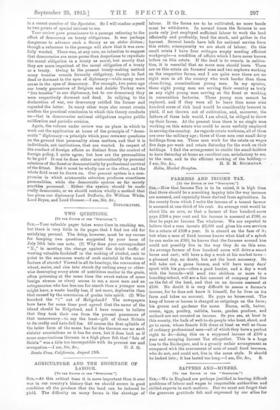FARMERS AND INCOME TAX.
[To TEN EDITOR or TEN " EPEOTAT011."] SIR,—Now that Income Tax is to be raised, it is high time that there should be a searching inquiry into the way incomes are assessed, and especially those derived from agriculture. In the county from which I write the income of a tenant farmer is assessed at one-third of his rent. An average rent would be about 15s. an acre, so that a farmer of four hundred acres pays £300 a year rent and his income is assessed at £100, so that he pays no Income Tax whatever. We are expected to believe that a man invests £3,000 and give, his own services for a return of £100 a year. It is absurd. on the face of it; but when a man of fixed income knows what kind of a splash he can make on £300, he knows that the farmers around him could not possibly live in the way they do on this sum. An average farmer of four hundred acres will drive a smart horse and cart ; will have a day a week at his market town— a pleasant day, no doubt, but not the least necessary. Ile will take out a game licence, and will have many days' sport with his gun—often a good hunter, and a day a week with the hounds—will send two children or more to a boarding-school, will see a fair amount of company and live on the fat of the land, and that on an income assessed at £100. No doubt it is very difficult to assess a farmer's income, for he does not know it himself, for he lives on his farm and takes no account. He pays no house-rent. The keep of horse or horses is charged as outgoings on the farm; his groom and gardener the same. Bacon, milk, butter, cream, eggs, poultry, rabbits, hares, garden produce, and orchard are not counted as income. So you see, at least in this county, the bulk of well-to-do people who hunt, shoot, and go to races, whose female folk dress at least as well as those of ordinary professional men—all of which they have a perfect right to do—doing this on a supposed income of £100 a year and escaping Income Tax altogether. This is a huge loss to the Exchequer, and is a grossly unfair arrangement as compared with the assessment of men of small fixed incomes, who do not, and could not, live in the same style. It should be looked into ; it has lasted too long.—I am, Sir, &o., B.


































 Previous page
Previous page